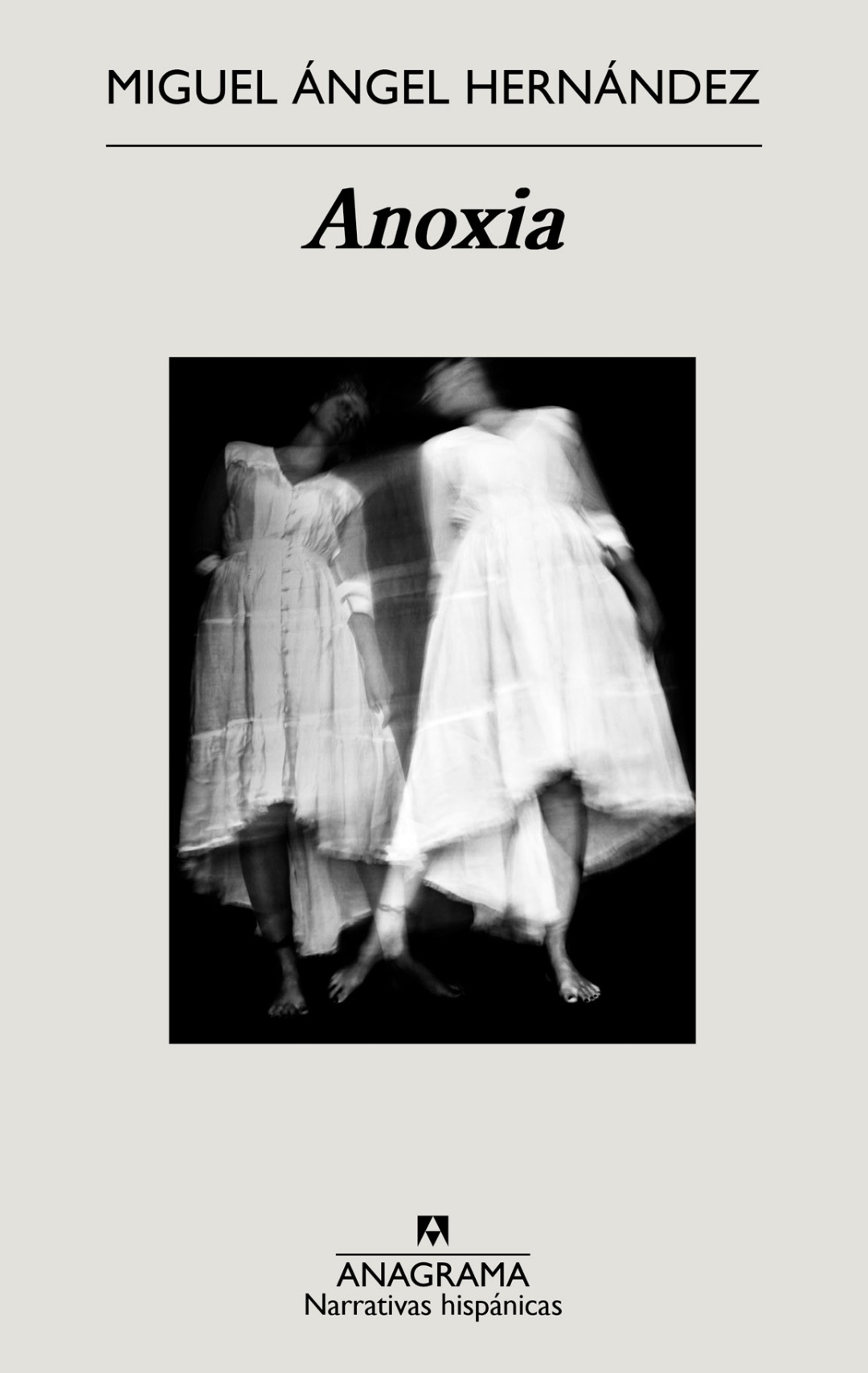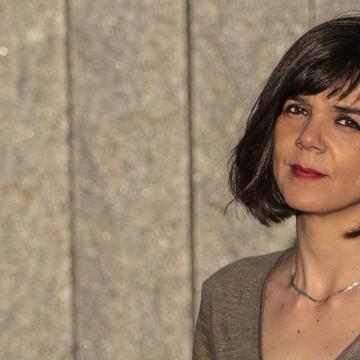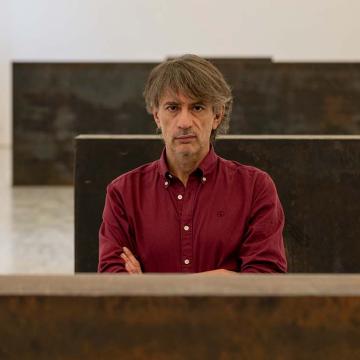Since opening on the 17th of April, Espacio Iberia has welcomed dozens of guests with one thing in common: their infinite talent. Talent that has inspired all the people who have sat there to listen to them.

There was once a writer from Murcia called Miguel Ángel Hernández. His literary career started just over a decade ago with a call from the mythical editor Jorge Herralde. Today, he strolls around the Madrid Book Fair with his fourth novel under his arm: ‘Anoxia’. A deep concern for the health of the planet, symbolised by the critical situation Mar Menor is in, features alongside constant themes in his literature —life, death, art and memory—.
On the 12th of October 2019, after heavy rain, thousands of dead fish appeared on the shores of Mar Menor. Diagnosis: anoxia or, in other words, lack of oxygen in the body. Dolores, the protagonist in the latest novel by Miguel Ángel Hernández (Murcia, 1977), witnesses this natural disaster and, in her own way, also suffers that fate after the death of her husband. At the same time, she crosses paths with Clemente, a mysterious old man who introduces her to post-mortem photography. Thanks to this dying photographic practice, Dolores will find the oxygen she needs to carry on. With Anoxia (Anagrama), this Art History professor who caught the attention of Jorge Herralde with his first novel, Intento de escapada, asserts himself as an outstanding student to his teachers: Paul Auster, Annie Ernaux or Emmanuel Carrère. For the Madrid Book Fair, an event sponsored by Iberia, we chat to him about learning, inspiration, commitment and, of course, talent.
You’ve just published your fourth novel and you’re already an established writer. Did you dream of something like this?
I always dream of having time to read because I consider myself more of a reader than a writer. But yes, I also dreamt of publishing my own stories. Doing so with a publisher like Anagrama is beyond my wildest dreams though, but it came true and it’s a privilege I don’t want to waste.
Today, which role do you feel most comfortable playing: that of professor or writer?
I have to keep quiet about it because the university pays me to teach (laughs), but I feel most comfortable as a storyteller. I also write essays and research, but I feel more comfortable telling stories than dealing with artistic texts.
“Sometimes a story appears as a series of events, others as an indescribable feeling and that’s precisely what compels me to write”
Speaking of teachers, which novelists have been your literary guides?
They are endless because, as I was saying before, I’m a compulsive reader and I devour books one after another. But, if I had to make a list of contemporary authors, I’d say Auster, DeLillo, De Vigan, Vila-Matas, Ernaux, Carrère, Hustvedt… I say this while looking at a black wall in my room with all the names of those who influence me. Whenever I read an author, something about them ends up staying with me.
Where do you find inspiration for your novels?
Inspiration comes from various places depending on what I’m going to write. One is my own experience, both in terms of location and emotion. Sometimes a story appears as a series of events, others as an indescribable feeling and that’s precisely what compels me to write. Then, there’s the world of theory and ideas, more connected to my career as an art historian. I translate many artistic dissertations into narrative.

‘Anoxia’ is the title of Miguel Ángel Hernández’s fourth novel. © Anagrama
Anoxia is a title with several interpretations. Tell us how this word relates to the story the book tells.
Anoxia means lack of oxygen and, indeed, it is a word that works at different levels within the novel. On the one hand, metaphorically: the shortness of breath suffered by the person who loses her dearest loved one. The protagonist has lost her husband and struggles to breathe, to resume her life. And, on the other, literally: Mar Menor, where the book takes place, suffers episodes of anoxia due to pollution. Our inability to breathe connects us to death and our need to breathe compels us to keep on living.
The action takes place in a village close to Mar Menor. Is the novel a homage to that place and its inhabitants?
Although in the end I dedicate the novel to the village that resists and rises above every disaster, the choice of that location and context relates to how inevitable it is to write about what’s happening in Murcia in particular at this time, but also in other places: nature is falling apart due to the actions of humankind. I wanted to talk about the villages (plural) of Mar Menor —that’s why I don’t mention one in particular—, about their relationship with that ecosystem and how exposed they are to the effects of climate change. In the end, the plot revolves around something cherished that we want to photograph before it is lost forever and that could happen to Mar Menor.
“As an author, it’s magical because you get to meet your readers and talk to them about things you’ve written in solitude”
In your previous novels, your protagonists were men. In Anoxia, however, she’s a woman: Dolores. What was writing from this point of view like?
After three books featuring protagonists that were like me, or myself directly, like in El dolor de los demás, I needed to put myself in a different place. At the beginning, I thought I’d find it challenging, but from the moment Dolores took over me —her way of thinking, of feeling, of being in the world— it wasn’t so hard. When you create characters, they end up possessing you and, just like Flaubert used to say that Madame Bovary was himself, Dolores is me in many ways.
How do you feel when you stroll around the Book Fair and sit down to sign copies of your novels? Do you enjoy feeling connected to the audience?
I’m deeply happy at the Book Fair. As a reader, I can’t wait for my book signing to be over so that I can go and buy books. As an author, it’s magical because you get to meet your readers and talk to them about things you’ve written in solitude. Literature is written in solitude in your pyjamas, and it is read by someone in solitude in their pyjamas. I describe literature as a pyjama party (laughs). At the Book Fair, that solitude joins hands.
“Without perseverance it all comes to nothing. In fact, I don’t consider myself particularly talented, but I’m obsessed with working and writing”
You live and work in Murcia. In your opinion, is it harder to get published if you live far away from the literary circles in Madrid or Barcelona?
This used to be more the case before. For a writer, being in Madrid or Barcelona was more worthwhile because you were in closer contact with the world of books —publishers, booksellers, journalists—. Nowadays, us provincial writers remain outside of this world, but innovative technologies help bridge the gap and maintain more freedom to write. I wouldn’t move away from Murcia, not just because of the quality of life here, but because I think it’s good for writers to be removed from that world of books that is not strictly literary.
Finally, what is talent to you?
That’s a tricky question. I think that it’s the predisposition of mind and body to do certain things, but I want to believe that’s just 5%, that the rest depends on hard work. Without perseverance it all comes to nothing. In fact, I don’t consider myself particularly talented, but I’m obsessed with working and writing. But talent is also related to class, race and gender; some talent can flourish or not depending on where, when and how you are born. It seems like talent is something individual, but it’s also built by society and culture.


